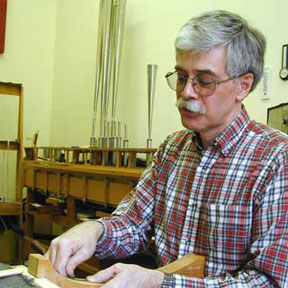 |
|||
 |
William Ayers Pastor's kid? Check. Musician? Check. Steam railroad fanatic? Check. Appreciates the fruit of the vine? Check. Enjoys travel to far-away places? Check. Facial hair? Check. It seems that many organ builders have similar backgrounds or interests, sometimes almost to the point of caricature. (It’s commonly understood in Lake City, for example, that if you have a beard, you probably work at the organ shop.) So it’s perhaps not surprising that these features of our head voicer, William Ayers, correspond not only to organ builders at large, but even his co-workers. But Bill is definitely his own man. Bill’s childhood was shaped by his father’s calling as a Presbyterian minister. He doesn’t remember New Castle, Pa., where he was born in 1949, because his family moved to Donora, Pa., when Bill was but 18 months old. Before he graduated from high school, his family would live in Ardara, Pa., as well as Crestline and Huntsville, Ohio. Experiences in Crestline particularly would kindle life-long interests. The Presbyterian church had a 1905 Pfeffer tracker organ, which sadly was replaced by a Baldwin during Bill’s years there. However, a fascination with the organ led him to ask for some of the discarded pipes, and to construct a few wood pipes of his own. Bill came of age during the Vietnam War, and his chief goal after graduation from high school was to avoid a trip to southeast Asia. Having studied the trombone since the fourth grade, he chose to enlist in an Army band, serving at Fort Devens and Fort Hood. Here a fellow band member was Stephen Long, later well known as Director of Music at Trinity Lutheran Church in Worcester, Mass.; they formed a recorder quintet, playing for their own entertainment. As a result of his Army career, Bill has had his fill of Sousa marches. After his discharge, Bill enrolled in the Cleveland Institute of Music, studying trombone performance with Robert Boyd, the long-time principal trombone for the Cleveland Orchestra. He played in the CIM Orchestra under the direction of James Levine, and participated in a North Carolina School of the Arts orchestra summer tour of Italy and Switzerland. After graduation, he played bass trombone with the Winston-Salem Symphony. In 1976 he returned to CIM for a Master’s degree (again studying with Boyd) and played in the Cleveland Philharmonic, a community orchestra conducted by Robert Marcellus. Armed with his degrees, Bill found that there were few positions available in trombone performance. Prompted by a friend who worked at the Noack Organ Co., Bill applied and was employed as a pipemaker there for about a year. Deciding that voicing pipes seemed more interesting than making them, he moved to Charlotte, N.C., and took a position with W. Zimmer & Sons. Here he worked from 1978-1994 and was involved in the voicing of dozens of organs across the country. Bill’s disenchantment with the sort of work undertaken in Charlotte and the decline of the Zimmer firm led him to look elsewhere for employment, and we were happy to hire him. He was soon involved in pipemaking again as well as tonal finishing. After the death in 1999 of Bob Sperling, our long-time voicer, Bill took over his duties. He now spends most of his days either doing pre-voicing in the shop, tonal finishing on the road, or tuning and maintenance work. Bill has been a member of the American Institute of Organbuilders for many years, and was one of the presenters at an AIO workshop on reed voicing in 2004. He has made several tours of European organs, including attending the re-dedication of the famous Isnard organ in Saint-Maximin-la-Sainte-Baume in 1989. Crestline, Ohio, already cited as the source of Bill’s interest in the organ, impressed him in another way as well. That city was the site of the Pennsylvania Railroad’s Crestline Engine Facility, home to the PRR’s experimental locomotives. Alarmed by the extensive facility’s decline into decrepitude since its closing in 1968, Bill became one of the co-founders of the Crestline Roundhouse Preservation Society, Inc., and established a website showcasing its history. In our shop, Bill is known for his appreciation of finer things, including Arts & Crafts furniture, good food (fine wine and chocolate in particular), and vintage classical recordings. He owns a Columbia “Graphophone,” which plays four-minute wax cylinders; ironically, given his overdose of marches in the Army, one of his most significant recordings is one of Sousa’s band. Dobson organs are built first and foremost for a musical purpose. Bill’s technical skills, musical ear and patience have been invaluable in establishing our reputation for tonal excellence. —drawn from The Organbuilder, Spring 2008 |
||
|
Our Shop • Instruments • Recordings • Testimonials Dobson Pipe Organ Builders, Ltd. Site conception by metaglyph All contents ©1999–2016 Dobson Pipe Organ Builders, Ltd. |
|||



